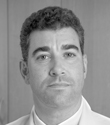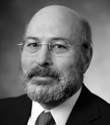|
|
Consensus or Controversy, Issue 4: Clinical Investigators Provide Their Perspectives on Controversial Issues in the Management of Gastric CancerFaculty Comments on Anti-Angiogenesis in Gastric CancerIn light of the AVAGAST trial data, do you expect that bevacizumab and newer-generation anti-angiogenic agents, such as ramucirumab, will play a significant role in the treatment of metastatic gastric cancer?
I hope that bevacizumab or some newer-generation anti-angiogenic agents end up playing a significant role in the treatment of metastatic gastric cancer.
My perception of the AVAGAST data was that a benefit was apparent for American and European patients. I would be interested in seeing a study that focused on those patients.
I’m skeptical about bevacizumab having a role, but I’m certainly open to studies that have evaluated other agents that target VEGF. I don’t yet have an opinion about ramucirumab, but I’m hopeful.
It very well could be. Ramucirumab is being evaluated right now as second-line therapy in a Phase III trial. A debate is also ongoing about whether or not to redo an AVAGAST-like trial. Progression-free survival was positive in that trial if you eliminate the Asian patient population.
But they are running out of time if ramucirumab is being moved forward. So do I believe there is an opening for anti-VEGF inhibitors? Yes, I do believe there is an opening.
Yes, actually I do. I believe that there is probably going to be a benefit. It’s just that when the trials are so heavily based in Asia, it’s a little harder to show benefit. I believe that’s based more on how they conduct their studies than on a biological difference.
Yes, I do believe anti-VEGF agents will play a significant role in the treatment of metastatic gastric cancer.
The AVAGAST data certainly were unexciting. I’m on a “value kick” right now, so my enthusiasm is low for data sets with expensive drugs that you have to microanalyze. That to me means the study didn’t work.
I’m hopeful. I believe that a benefit probably does exist with anti-VEGF therapy for these patients in the United States who develop gastric or GE junction adenocarcinomas. I’m not using such an approach off protocol, though.
There were hints of promising results in the AVAGAST trial. I believe that future studies should not combine Asian gastric and GE junction cancers with Western gastric and GE junction cancers. I’m worried that there are 2 different biologies.
I am usually better at predicting the past than the future, so I will answer the question in a different manner. We hope we can find a population that benefits from bevacizumab because clearly some patients benefit from bevacizumab. We hope the same for ramucirumab, though I haven’t seen any data yet. I have to be optimistic.
AVAGAST was a negative study, though it was almost positive in that certain groups exhibited a benefit with bevacizumab. The authors put quite a spin on the results during the discussion at ASCO. The results of this study were recently published in the JCO.
With regard to ramucirumab, this agent is currently being evaluated in clinical trials, but I don't know if we can distinguish these antibodies. |









